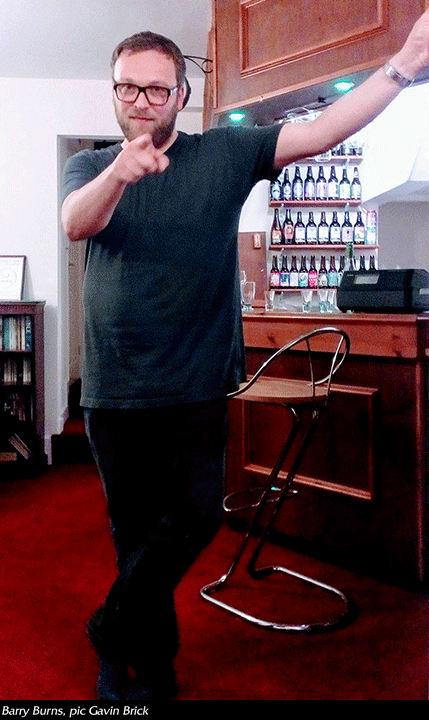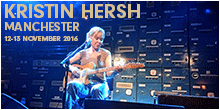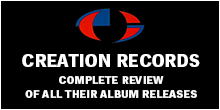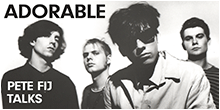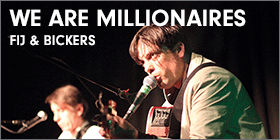

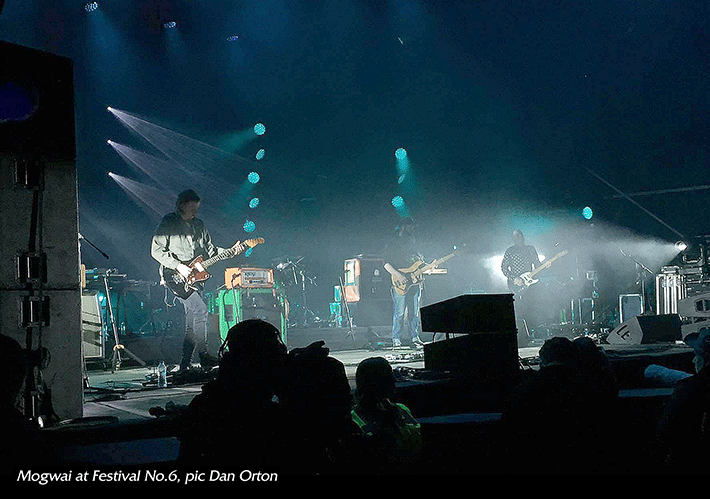
Mogwai set the controls for the heart of the suns
Barry Burns on Festival No.6 and writing bits for an above-average band
2017 is turning into a very good year for Mogwai. It's some twenty years since they first announced their arrival with the Young Team album and over the past two decades they have ploughed their furrow with the minimum of fuss, happy to progress at their own pace, never leaping from one fad to another, or making claims of their own greatness. Enduring and solid, you might think ... not quite big enough to create a lasting legacy, or even to damage the charts in a serious way. Certainly not Pink Floyd.
However, it appears that many people are beginning to realise there may be more to Mogwai than meets the eye. They are discovering the sparkle that lies just beneath the surface, the little bit of magic that lifts them above their peers and turns them into major players. Mogwai are becoming the sort of band who regularly headline major festivals. The sort of band who punch into the top ten with their new record. The sort of band who who can conjure up a majestic piece of work in the shape of a new album that achieves universal approbation. Mogwai are at the top of their game, with Every Country's Sun standing out above everything they have previously achieved. And they are taking the album out on the road this autumn, to Europe and the States before the tour climaxes in their hometown of Glasgow just before Christmas.
In the meantime, with their album at number six in the charts, Mogwai are asked to headline at Festival No.6, the large boutique weekend gathering that is held at magical Portmeirion every year. The beautiful Italianate village, just outside Porthmadog in Gwynedd, is the place they filmed the 1960s' cult television series The Prisoner and Mogwai join the list of headliners from previous years that includes The Manics, Noel Gallagher, The Pet Shop Boys, et al.
Thankfully this year the weather been kind on the Friday, so the main arena is dry underfoot. The band head on to stage quietly before launching into their new album. They seem a little nervous and they certainly don't communicate well with the audience between songs, Stuart Braithwaite offering exactly the same words of thanks after every track. However, the audience aren't here for post-song banter, they are here for the sounds and Mogwai are sharp, cutting through the darkness with more than just an effective lightshow. The members of the band juggle round the stage, swapping instruments, yet the intensity never falters as guitars first charm and then crash with seeming abandon. The set concludes with a mighty blaze of light and the audience stand motionless for some time before they finally shake them themselves back to reality and head off to tents or buses or cars.
Most of the band head straight off after the show but guitarist/keyboardist Barry Burns sets off to Harlech with his family for a few days' break. He wants to see more of Portmeirion, the festival, and the local sights, though the list of things to see he has been sent by his mate Gruff Rhys (Super Furry Animals) would take him a couple of months to complete. Barry kindly agrees to talk to us in our bar at Harlech...
How did you feel about headlining Festival No.6 at Portmeirion?
Honestly, I hadn’t heard of it before. And then when we did tell all of our friends that we were playing it, like Gruff Rhys, they were “Oh, it’s amazing, you’ll love it. It’s an amazing place”. We found out afterwards it was where they filmed The Prisoner. We didn’t get the No.6 reference at all until someone told us. I had no idea what Portmeirion was, so we revisited the show, my wife Rachel and I, watched a sort of best of moments thing just to see what it looked like. When you actually get there to look at it, it’s like “Wow!” It’s almost unreal.
We were really pleased to be asked to headline. Honestly it’s a surprise when we get asked to headline a lot of places because we still feel like we’re this wee band. I know we’re not but my second hand Volvo doesn’t say much about how much money we’re making, so it doesn’t feel like we’re a big band! I think if we’d been around ten years before, I think we’d all be living comfortably somewhere hot, but we’re sort of peaking at the end of the music industry, almost, so nothing ever feels salubrious or ostentatious.
When you think that way how does it feel when you walk out on to the big stage?
I think my nerves have calmed these days. It’s always really exciting. It’s not like a shaky leg thing anymore when it used to be that. It sort of manifests in different ways like you get a sore stomach for an hour, or you feel like you’ve eaten too much. The nerves have changed into something less obvious. But they are still there and it’s really exciting to play the shows, always.
How did you feel it went?
I thought it was OK. It’s just at the very beginning of the tour and these shows were almost last minute compared to a lot of the other ones we’ve done. We hadn’t had enough time to rehearse because we’d just finished a soundtrack, so we were under-rehearsed. But by the time it gets a week into the next tour I think everything will be as usual. We're off to Europe, America, and by the time we get to this huge show in Glasgow in December I think it’s going to be – I wouldn’t say a well-oiled machine – but it will be ... above-average.
Is that how you would describe Mogwai, above average?
Yeah, always.
You said once, “We’re working towards something, we don’t know what it is.”
Aye, I don’t know where it is. What is it? Where is it? I don’t know.
When you are creating music with no words, do you think of a theme or something that you are aiming at, or does the music come first and then you name the songs?
I think it will probably be different for different people in the band. There’s three writers now: before John (Cummings) left there used to be four. We all write individually so I can’t speak for the rest of the band. It’s basically one person’s idea elaborated upon. It’s never a collaboration in Mogwai, never. Maybe on the very first album they said that they did a few songs together but it’s very rarely collaborative. Basically, I just mess around on a piano or a guitar or drum machines until something happens and I send it to the band and I think it’s probably the way they do it too. We just mess around.
So you have a pretty firm idea of what the song should sound like before you give it to the band?
These days, yes, it used to be the case that it was just Barry’s bits, which was just like thirty seconds of something that sounded OK, and then we’d try and make it good. And sometimes it didn’t work ... and we’d put it out anyway. It's the same for everyone. I remember the first song I ever wrote was a complete song and I made up all the parts for it myself. It was ‘Hunted By A Freak’ (Happy Songs For Happy People, 2003). We got this Vocoder and I thought I’d try and knock up some organ parts and then some guitar parts and the bass. I think the drums are a primitive drum machine. That was the first one ever. I don’t think I did a complete song again until the new album which is the title track. I did all the parts for that.
So, where did that title, ‘Every Country’s Sun’, come from?
It’s a friend of ours who thought that when you got on a plane and you go to Spain the reason that Spain is hot and Scotland isn’t hot is because it’s a different sun. She thought that every country had a different sun. So she’s obviously never travelled on a train where you would gradually see that it was the same sun. So she didn’t understand what sun was. It goes deeper than that, like she didn’t understand that space wasn’t a place. She thought you could land on space. She’s a primary school teacher!
So did that inspire the music?
No, I told the band during the recording sessions about it and they were like, “My god ... there’s got to be a least a song title in that.” It’s only the second time we’ve used the album title for a song title, ‘Cody – Come On Die Young’ was the only other one.
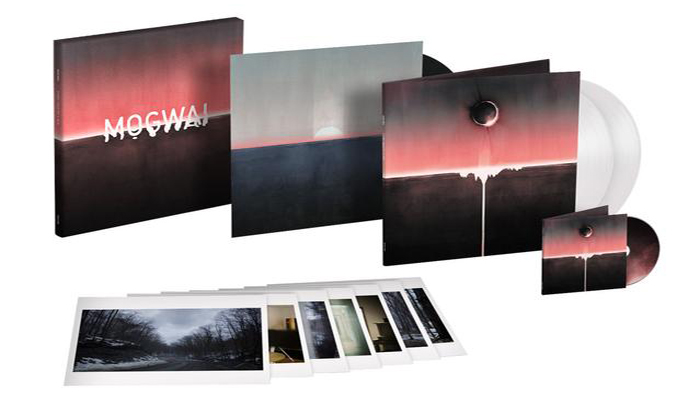
Do any of your songs have words?
They do but usually they are very fifth year poetry failure. I put them out there because we need to have a tune. It’s not about a message, it’s just trying to fill space because something didn’t work. It’s just a sound. I think recently Stuart has made up songs with the singing in mind which is unusual for us and he’s made up lyrics for the last album which actually have a bit of meaning behind them. And you can hear them. Usually they are buried. It’s a new thing.
How do you know when a song needs words?
Usually if it sounds like it’s going to be thrown away because it doesn’t have a melody. We’re like, “Oh, let’s try some singing on it.” But this time he had a melody in mind and he did four and we used two on the record and two as extra tracks. I think so, I’m so bad in keeping up with this stuff. My dad tells me when I’m playing concerts. I know that something’s going to happen, I just don’t know when!
On the new album you went back to producer Dave Fridmann at the isolated Tarbox Road Studios, why was that?
Honestly, it was because John didn’t like the experience and he’s not in the band anymore. We all really wanted to go back but he didn’t want to do it, but now he isn’t there we decided to go back. It’s such a great place. We’ve got a Glasgow studio that we own but if you are ten minutes away from somewhere you are going to go home at five and read the kids a bedtime story, so we removed ourselves from that temptation and spent twelve hours every day for four weeks of just constant work. And there is literally nothing around for seven miles. It’s a bit like The Evil Dead or something. It’s a scary place to be at night as there’s coyotes and bears and stuff so you don’t go outside.
You last used Dave with Rock Action?
Yeah, well when we recorded it John Niven, who has written Kill Your Friends, was an A&R guy and he’d dropped Muse and another really huge band because he didn’t think they were very good, so he wasn’t a very good A&R guy. Anyway, he signed us thinking we were going to be the next Pink Floyd. He’s a Scottish guy and was in tune with us humour-wise and we had a great time with him. He said that he was going to come over to Dave Fridmann’s place during the recording which we usually don’t allow, but because he was a funny guy we said it would be OK. We said that we had Gruff Rhys from Super Furry Animals singing on a track and he said, “Amazing they are a really great band and you’ve got singing on it which is even better for the charts.” And he sat down and we all went out of the room and he realised that Gruff was singing in the Welsh language and it was a real facepalm moment – we were not going to be the next Pink Floyd. He was thinking this is doomed to the bottom of the box and I think he got worried because he’d spent a lot of money on the album. I don’t think we’ve recouped the money on that record. It did quite well in America which helped but in general we can’t please America. We don’t seem to go down so well. I think it’s very difficult to break America if you don’t tour there all the time. Anyway, I like Pink Floyd with Syd Barrett in them but I don’t think anyone else in the band is a fan. I don’t think any of us could be bothered to be the new Pink Floyd.
It’s nearly four years since your last album proper but you have been working on soundtracks in the meantime. Is that something that appeals?
It is. I was just saying to you that we’ve just finished another one for this Hollywood film. It was an interesting experience because we did a sort of Hollywood documentary which was a collaboration but the latest one we did as just a Mogwai thing, a proper sci-fi film that’s out next year. It was interesting to see the structure of Hollywood and how it worked, how directors are quite far down the chain of command. Producers, executive producers, people with money, you have do a lot of jumping through hoops for them and as long as you are OK with that, it works. You realise that this project is already a compromise: it’s not a pure Mogwai thing, it’s like you are working for someone else.
Do you think the new album sounds a little soundtracky?
I think it’s probably been influenced by the stuff that we’ve done, even if it’s just sounds. It’s hard to pinpoint the influence of that stuff but it’s definitely there. There’s a hangover from the soundtrack stuff.
Are you pleased with the reception the new album has been getting?
Usually I don’t look at the reviews cos they’re usually like, urghh. But I got an email from somebody who said you should check out these reviews. It’s weird what’s happening. They are mostly positive. In metacritic it was like twenty positive, four mixed, no negative. Something like seven out of ten.
I hate marking albums. You can't quantify music.
It’s ridiculous. The most stupid thing I’ve ever seen was when Pitchfork started doing 7.8 out of ten. It’s arsey. It’s lazy and pointless. It’s worse when you read a review and it reads like an eight but the mark’s a six so you know that the sub-editor has come in and thought, well our magazine isn’t really about this kind of music so I’ll mark it down. You read a bad review and you see it’s got a high mark. One of ours looked like a shitty review and they gave it seven out of ten. Well, that reads like a five so the sub-editor is, “Well, I like Mogwai so I’ll mark it up.” It doesn’t mean anything.
What does mean something is the effect music has on your soul, how it can lift your spirits to the skies or drag you screaming to the darkest depths. How it weighs on your mind, makes you think and provides endless hours of conversation and debate with friends. Barry and his band make music that matters, that makes sense in a world that is going to hell. Twenty years on Mogwai are still growing, still progressing, and achieving success without playing corporate games. And if they get any bigger they my get a sun of their very own. Pink Floyd never did that...
